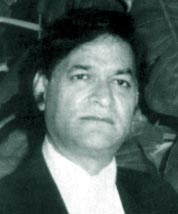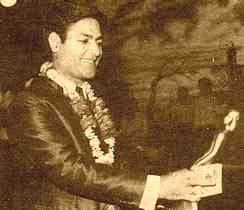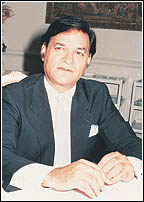Sohail Rana

The Unmatched Music Maestro

Sohail Rana

The Unmatched Music Maestro
Pakistan has had a number of unforgettable musicians like Nisar Bazmi, Robin Ghosh, Nashad and Khalil ahmed, but the place young Sohail Rana made in the film industry and TV in Pakistan remains unmatched and special. His famous songs are still being imitated by the new singers because of the beautiful melodies. He sprang to the heights of glory when "akelay na jana" sung by Ahmed Rushdie was aired. Later the same song became the basis of making the film "Arman" by his friend Waheed Murad.
Sohail Rana, son of renowned Urdu poet, Rana Akbar Abadi, was born in Agra, India, to a highly literary and respectable family. He along with his family migrated to Pakistan after partition. Sohail Rana completed his early school education from Hyderabad, and later earned his Bachelor of Arts degree from the university of Karachi from D.J. Science College initially. Later he received his final B.A. degree from National College, Karachi. Sohail Rana met Waheed Murad for the first time at a get together at Waheed Murad’s party in Karachi. In due course of time, Sohail Rana and Waheed Murad became very close friends, because of their several common interests such as music, films and literature. Incidentally, Sohail Rana took admission in the University of Karachi for Masters degree in English literature when Waheed Murad was attending the convocation that year. Thus started a durable friendship between them, which lasted up until Waheed's death in 1984.

Sohail started his film career in early 60s when he arranged music for films like ‘Insaan badalta hai’ in 1961 and later ‘Jab say deikha hai tumhain’ in 1963. Both films were produced by none other than his friend Waheed Murad. However, Sohail Rana earned plaudits from his fans for the superb composition of ‘Mujhay tum say mohabbat hai’ (Film ‘Heera Aur pathar’, duet, Ahmed Rushdi – Najma Niazi), which figuratively added fresh elements to his stew. ‘Heera Aur pathar’ became a musical phenomenon, and Sohail Rana became a necessity in the burgeoning music industry. But Sohail became an instant celebrity when Pakistan’s first platinum jubilee film, ‘Armaan’ was released on March 18, 1966, which may be the finest and most gripping movie to date. It is an epic tale of broken hearts and broken dreams. Sohail Rana’s excellent composition for the songs of ‘Armaan’ is, indeed, his greatest achievement as a music composer, which will stand as a musical high point as long as the Pakistani film industry exists. Sohail Rana won the prestigious Nigar and graduate Awards for the best composer for the film ‘Armaan.’ Songs of film Arman ("Akelay na jana", ‘Ko-Ko-Korina,’ ‘Bay taab ho udhar tum’, ‘Jab pyar mein do dil miltay hain’, ‘Meri Qismet bata, hai meri kya kheta') are still being listened to in each corner of the country with same freshness as these were in 1966.
The famous Akelay Na Jana (left) Ashiana Jal Gia (right)
After "Armaan", Sohail was unstoppable. His musical score of film ‘Ehsaan’ attained silver jubilee with such favorites as ‘Ik naye maur pay’, ‘Aye meri zindigi aye meray hum safar’, ‘Do akhian, ye do sakhian.’ Then came "Do Raha", which he also produced and still unexplored unleashed his artistic talents. ‘Mujhay tum nazar say gira to rahay ho’, ‘bhooli huwee hoon dastaan’, ‘tumhain kaisay bata doon tum meri manzil ho’ were super hit songs of the film which like that of film Armaan were instant hits. The songs he composed for ‘Doraha’ also evince that he is an extraordinary composer and an authority of the highly specialized realm of music compositions, where his competency and artistic skills are unmatched. The film ‘Hesaab’ which was released in 1986 happened to be the last movie for which Sohail Rana composed music.
Besides films, Sohail embarked upon a massive effort to educate children about music and started off programmes on PTV, which lasted for almost 19 years from 1968 to 1987, like ‘Kaliyoan Ki Mala’ and ‘Sung Sung Chalain.’ In those days, he wrote and composed more than two thousand songs for children. These programmes were so popular that many talented boys and girls flocked PTV during those days. Were these programmes and his efforts were successful? One needs only to read a long list of children who later hit the charts and became popular singers. Some of these include: Mohammad Ali Sheyki, Amjad Hussain, Alamgir, Mona sisters, Benjamin sisters, Adnan Sami, Wasim Baig, Nazia Hasan, Zohaib Hasan, Afshan Ahmed, Nazneen, and Fatima Jaffrey. Among the above talented students, Anwar Ibrahim, the youngest student made a special name in naat khaani and hamd-o-sana. Sohail Rana released two cassettes of Naats by Anwar Ibrahim “Jaan-e-Madina” vol.1 and 2. Both of these cassettes contained the Naats and Humds by Sohail Rana’s father Janab Rana Akbar Abadi sahab.
 Sohail Rana also served as Resident composer in
PIA Arts Academy sponsored by Pakistan International Airlines from 1972 to
1974, where he conducted Ballet Heer Ranjha, composed and re-arranged music
for folk dances and under the directorship of legendary personality Mr. Zia
Moyeddin and with a team of eighty eight dancers, musicians, singers, etc,
he toured the whole world performing in prestigious auditoriums and earned
the appreciation of international audience. He received the prestigious
Presidential Award the “Pride of Performance”, Gold Discs from EMI for the
vinyl album, ‘Khyber Mail’ and his musical works touching the highest sales
figures of EMI ‘s records from 1954 to 1974 in their final sales figures. He
was also given the United Nations Peace Messenger Award, conferred on him,
at the United Nations in New York in 1987. Sohail also achieved legendary
status by influencing and shaping the Pakistani culture. He participated and
represented Pakistan in various international music festivals and
conferences and undertook several cultural and commercial tours almost all
over the world. From 1972 onwards, visiting and performing shows in Iran,
Afghanistan, Australia, Fiji Islands, Russia, Romania, Turkey, Jordan,
China, Dubai, Abu Dhabi, France, Spain, USA, Dominican Republic and Canada.
Sohail Rana also served as Resident composer in
PIA Arts Academy sponsored by Pakistan International Airlines from 1972 to
1974, where he conducted Ballet Heer Ranjha, composed and re-arranged music
for folk dances and under the directorship of legendary personality Mr. Zia
Moyeddin and with a team of eighty eight dancers, musicians, singers, etc,
he toured the whole world performing in prestigious auditoriums and earned
the appreciation of international audience. He received the prestigious
Presidential Award the “Pride of Performance”, Gold Discs from EMI for the
vinyl album, ‘Khyber Mail’ and his musical works touching the highest sales
figures of EMI ‘s records from 1954 to 1974 in their final sales figures. He
was also given the United Nations Peace Messenger Award, conferred on him,
at the United Nations in New York in 1987. Sohail also achieved legendary
status by influencing and shaping the Pakistani culture. He participated and
represented Pakistan in various international music festivals and
conferences and undertook several cultural and commercial tours almost all
over the world. From 1972 onwards, visiting and performing shows in Iran,
Afghanistan, Australia, Fiji Islands, Russia, Romania, Turkey, Jordan,
China, Dubai, Abu Dhabi, France, Spain, USA, Dominican Republic and Canada.
Sohail Rana also composed and produced music for two Mass Gymnastic Displays held in Islamabad in 1975-76 under the auspices of the Ministry of Culture and Education. His last performance in Pakistan before he migrated to Canada happened to be the great ‘South Asian Federation Games’, which was held in Islamabad in 1989 and in which he participated with a group of ninety-five singers, twenty-five piece orchestra and 110-piece brass band. Sohail Rana also composed and conducted the background music for the documentary film, ‘Moenjodaro’, and also composed and conducted the entire musical score of ‘Beyond the last mountain’ (Musafir) by producer/director/ ex-senator Mr. Javed Jabbar. Moreover, ‘Beyond the last mountain’ won the critical acclaim by the renowned Indian actor, Raj Kapoor, at the Bombay film festival.
Besides film, a number of famous and everlasting national songs are aslo attributed to Sohail Rana. His musical masterpieces like ‘Sohni dharti’ sung by Shehnaz Begum have become part and parcel of Pakistani culture. Likewise, ‘Jeeway Pakistan’, and ‘Mein bhee Pakistan hoon’ achieved tremendous success. During his forty monumentally influential years as a music composer; lyricist and producer, Sohail Rana also composed the Summit Anthem ‘Allah- O – Akbar, for Pakistan television corporation, in the voice of Mehdi Zaheer and a group of hundred singers, for the first Islamic Summit conference held in Lahore, Pakistan, in 1974. PTV awarded him as well as Mehdi Zaheer on the release of this anthem. His magnificent compositions for the Nazm, ‘Qasm us waqt ki, jab zindigi karwat badalti hai.’ (Film: ‘Qasam us waqt ki.’) is a cornerstone of Pakistani entertainment that reflect reality.
One of Sohail Rana’s innumerable accomplishments is that he also worked for the Pakistan’s ministry of culture as Director General from 1976 to 1978. He headed the project of National Orchestra and Choral Ensemble of Pakistan in Islamabad. All along his career as music director, Sohail Rana demonstrated an unusual aptitude for music as a teenager. He learned music from various ustads and familiarized himself with numerous musical instruments, which added to his experience. Nowadays, Sohail resides in Toronto, Canada and runs two music schools. He is also planning to establish a multi media company in Toronto.
|
| HOME PAGE | MORE CELEBRITIES | Copyright©JalalsPages - 2005 - 2009 |